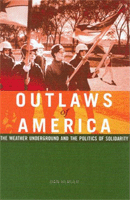

|
OUTLAWS OF AMERICA: The Weather Underground and the Politics of Solidarity by Dan Bergen
Previous accounts of the WU history have, unfairly,
drawn comparisons with Germany's Red Army Faction/Baader-Meinhoff
Gang. The gulf between the two movements is huge, and only on a
superficial level is there any degree of similarity. Both were populated
by white, middle-class students, and there the comparisons end. The Weather Underground were a broadly supported
guerilla organisation who were reflective and progressive and who
took pains to ensure nobody got hurt in any of their many bombings.
The RAF, meanwhile, were a minuscule group of arrogant mavericks
who showed no compulsion in shedding blood, especially if it came
out of a policeman. In “Outlaws...” Bergen intertwines the
history and legacy of the Black Panthers and the Black Liberation
Army with that of the WU. By the end of the 60's, the CIA and FBI
were shooting leaders of the Black civil rights movements –
Martin Luther King , Malcolm X, the Black Panthers Huey Newton,
to name but a few. The war in Vietnam was escalating beyond control,
despite Nixon's promises to the withdraw all the troops. National
Guardsmen turned their guns on striking students at Kent University,
killing 4. Many felt it was time to hit back. The weathermen went underground overnight, when
a bomb some members were making went off prematurely, killing three
of the bomb-makers (the only victims of the WU bombing campaign).
Up until this point, Weathermen were involve in a number of Days
of Rage, organised riots against the police and selected property,
rather like today's Black Bloc's. Following the explosion, Weatherman
became the Weather Underground and unleashed a series of high-profile
bombings against the “military-industrial complex”. A
book, “Prairie Fire”, was distributed overnight to shops
all over the US, explaining the groups politics and analysis. WU folded in 1976, though some of it's activists
are still in prison or underground. Since their demise, the group, and groups like
it, are often criticise for being white, middle class and therefore
acting out of a guilt complex. Such accusations are usually a lot
truer of the critic than the accused. What becomes clear in Bergman's
book is that these people acted because they felt it was the best
thing they could do to help others being mercilessly bombed by the
US government. While most white, middle class people retreated to
their positions of privilege and did nothing, WU took advantage
of their educations and social positions to affect positive change,
acting out of rage, not guilt. There is lots to learn in the WU's history for
contemporary radicals. This book is a good place to start.
|
|
SchNEWS, PO Box 2600, Brighton, BN2 0EF, England Phone +44 (0)1273 685913 email: schnews@brighton.co.uk @nti copyright - information for action - copy and distribute |
|
 In-depth
examination of one of the best groups to come out of America in
the 1960's – no, not the Beatles, but the Weather Bureaux (AKA
the Weathermen, AKA the Weather Underground).
In-depth
examination of one of the best groups to come out of America in
the 1960's – no, not the Beatles, but the Weather Bureaux (AKA
the Weathermen, AKA the Weather Underground).